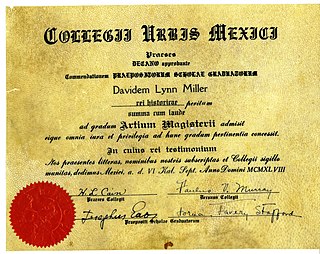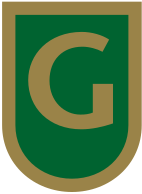
Vocational education is education that prepares people to work as a technician or to take up employment in a skilled craft or trade as a tradesperson or artisan. Vocational education is known by a variety of names, depending on the country concerned, including career and technical education, or acronyms such as TVET and TAFE.
Abitur, often shortened colloquially to Abi, is a qualification granted at the end of secondary education in Germany. It is conferred on students who pass their final exams at the end of ISCED 3, usually after twelve or thirteen years of schooling. In German, the term Abitur has roots in the archaic word Abiturium, which in turn was derived from the Latin abiturus.

Education in Canada is for the most part provided publicly, and is funded and overseen by provincial, territorial and local governments. Education is within provincial jurisdiction and the curriculum is overseen by the province. Education in Canada is generally divided into primary education, followed by secondary education and post-secondary. Within the provinces under the ministry of education, there are district school boards administering the educational programs.

A diploma is a certification, deed, or document awarded by an educational institution testifying the recipient has graduated by successfully completing their courses of studies. Historically, it has also referred to a charter or official document of diplomacy.

Education in Singapore is managed by the Ministry of Education (MOE). It controls the development and administration of state schools receiving taxpayers' funding, but also has an advisory and supervisory role in respect of private schools. For both private and state schools, there are variations in the extent of autonomy in their curriculum, scope of taxpayers' aid and funding, tuition burden on the students, and admission policy.

The education system in Switzerland is very diverse, because the constitution of Switzerland delegates the authority for the school system mainly to the cantons. The Swiss constitution sets the foundations, namely that primary school is obligatory for every child and is free in state schools and that the confederation can run or support universities.
Education in Spain is regulated by the Ley Orgánica 8/2013, de 9 de diciembre, para la mejora de la calidad educativa that expands upon Article 27 of the Spanish Constitution of 1978. The Spanish education system is compulsory and free for all children aged between 6 and 16 years and is supported by the national government together with the governments of each of the country's 17 autonomous communities.

Kardinia International College is an independent K-12 school located in Bell Post Hill, Geelong, Victoria, Australia. It is a triple campus college, residing on the site of the former Morongo Girls' College and has two other campuses, one in Lovely Banks, Geelong and another located in Chiang Mai, Thailand. Enrolment across the school is usually around 1800 full time students.
Biotechnology High School (BTHS), or commonly referred to as Biotech, is a four-year comprehensive vocational public high school serving students in ninth through twelfth grades in Freehold Township, Monmouth County, United States, as part of the Monmouth County Vocational School District (MCVSD). Its curriculum includes a science program, consisting of eight different science classes spread over four years, designed to prepare students to pursue further education in biotechnology and the natural sciences. Emphasis is placed on research, laboratory skills, critical thinking, problem solving, technology, and teamwork. Over 90% of the 2009 graduates selected college majors in the life sciences. The school has been accredited by the Middle States Association of Colleges and Schools Commission on Elementary and Secondary Schools since 2005.
Education in the Philippines is provided by public and private schools, colleges, universities, and technical and vocational institutions in the country. Funding for public education comes from the national government. For the academic year 2017–2018, about 83% of K–12 students attended public schools and about 17% either attended private schools or were home-schooled.

St Paul's Grammar School is an independent non-denominational Christian co-educational early learning, primary and secondary day school, located in Cranebrook, an outer western suburb of Sydney, New South Wales, Australia. Established in 1983, St Paul's Grammar School has approximately 860 students, from early learning through Kindergarten to Year 12.

The A Level is a subject-based qualification conferred as part of the General Certificate of Education, as well as a school leaving qualification offered by the educational bodies in the United Kingdom and the educational authorities of British Crown dependencies to students completing secondary or pre-university education. They were introduced in England and Wales in 1951 to replace the Higher School Certificate.
Since gaining independence from France in 1956, the government of Tunisia has focused on developing an education system which produces a solid human capital base that could respond to the changing needs of a developing nation. Sustained structural reform efforts since the early 1990s, prudent macroeconomic policies, and deeper trade integration in the global economy have created an enabling environment for growth. This environment has been conducive to attain positive achievements in the education sector which placed Tunisia ahead of countries with similar income levels, and in a good position to achieve MDGs. According to the HDI 2007, Tunisia is ranked 90 out of 182 countries and is ranked 4th in MENA region just below Israel, Lebanon, and Jordan. Education is the number one priority of the government of Tunisia, with more than 20 percent of government’s budget allocated for education in 2005/06. As of 2006 the public education expenditure as a percentage of GDP stood at 7 percent.

The International School of the Basel Region AG is an English-speaking school for students from ages 3–19 (PYP1-DP2). ISB is an authorised International Baccalaureate (IB) World School, and offers the following programmes:

Kuben Upper Secondary School is an upper secondary school at Økern in Oslo, Norway. The school is part of Kuben Vocational Arena, and is Oslo's largest Upper secondary school, with approximately 1,850 students. Kuben shares the arena with Oslo Technical School.
A high school diploma or high school degree is a North American academic school leaving qualification awarded upon high school graduation. The high school diploma is typically obtained after a course of study lasting four years, from grade 9 to grade 12. The diploma is awarded by the school in accordance with the requirements of the local state or provincial government. Requirements for earning the diploma vary by jurisdiction, and there may be different requirements for different streams or levels of high school graduation. Typically they include a combination of selected coursework meeting specified criteria for a particular stream and acceptable passing grades earned on the state exit examination.

Benjamin Franklin International School is an International American school located in Barcelona that provides education from Nursery to Grade 12 to approximately 689 students from over 52 different nationalities. The school is a private, non-profit, co-educational day school with three divisions: Elementary School, Middle School and High School. BFIS offers three diploma programs: American High School Diploma, Spanish Baccalaureate Diploma and International Baccalaureate Diploma.

The Goethe-Schule Buenos Aires belongs to the Goethe School Association, a nonprofit Civil Association that brings together the parents of students. Since it is a German School Abroad (DAS), it is sponsored by the Federal Republic of Germany. It is a recognized cultural exchange school that teaches and promotes the German language. It is located in the town of Boulogne, in the province of Buenos Aires, 20 km north of the center of the City of Buenos Aires and includes three levels: kindergarten, primary school and secondary school. The school has more than 1500 students in the three levels. A fourth section of the school is the Humboldt Academy, an educational institution dedicated to teaching foreign languages, mainly German, where courses for adults and children are taught outside of the school’s regular classes.
The Spanish Baccalaureate is the post-16 stage of education in Spain, comparable to the A Levels/Higher (Scottish) in the UK, the French Baccalaureate in France or the International Baccalaureate. It follows the ESO. After taking the Bachillerato, a student may enter vocational training or take the "Selectividad" tests for admission to university.

Center of Pastoral Liturgy of Barcelona is a public association of the Christian faithful, created in 1958 in the Archdiocese of Barcelona. Its main objective is to promote the liturgical aspect of the Church's pastoral action, especially through the publication of educational publications adapted to different circumstances and times.













